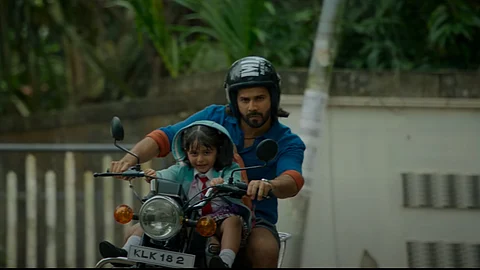‘Baby John’ review: A ‘Theri’ remake that offers nothing new
When Meera (Keerthy Suresh) tells DCP Satya Verma (Varun Dhawan) that she’s a “Chennai ponnu”, you fully expect a “Thelaivvaa” joke to drop from the supercop’s mouth. Or at least, a reference to curd rice or the lungi. But perhaps because Kalees, the director of Baby John, and Atlee, its producer, are actually south Indian, the blessed DCP doesn’t offer her lassi in a coconut. Small mercies in a remake that otherwise tries desperately to amp up the mass-iness of an already loud original – Theri (2016).
Mass moments in cinema are an unwritten contract between the star and his audience. The relationship has to be cultivated. Everybody knows what’s happening on screen is unrealistic and frankly, quite absurd. But the audience buys into it all – the punch dialogues, the sunglass swag, the cigarette lighting in slow mo, the beating up of one hundred goons in one second – because it is their star who is doing it. That’s why it’s possible for Pushpa (Allu Arjun) to wear a saree and kill everyone around him with his hands and legs tied, and for such a film to make over a thousand crores. Not everybody can hope to replicate it.
In Baby John, Varun Dhawan attempts to do what Vijay effortlessly pulled off in the Tamil original. John (Varun Dhawan) is a seemingly harmless baker in Alappuzha who lives with his precocious daughter, Khushi (Zara Zyanna). They call each other baby, and Khushi’s teacher, Tara (Wamiqa Gabbi) is also part of this idyllic universe. However, their peaceful ‘baby’ life is shattered when a bunch of goons enter the landscape, and everyone’s required to grow up overnight. Is John really who he says he is? What is the mystery of his history and current geography?
You already know most of it if you’ve watched the trailer. The flashback. The origin story. The harmless hero’s real avatar.
Baby John is largely a scene-by-scene remake of Theri, with even the dialogues intact. The tweaks to the remake don’t make it any better. Take, for instance, Jackie Shroff’s Babbar Sher, the chief villain. In Theri, this role was played by the chilling Mahendran in his crispy white politician vetti-sattai. He emanated menace with his controlled body language and benevolent smile.
Shroff, on the other hand, is written as a supremely deranged ganglord who looks like he needs 10 litres of L’Oreal shampoo for severely damaged hair. His actions make little sense and the over-the-top characterisation turns him near-comical. He appears and disappears like an annoying pop-up that the hero must block on his browser, even as these encounters are hyped to the moon and beyond by Thaman’s extra loud background score.
The screenplay switches between Satya’s shiny “good vibes only” song-and-dance romance and the grim faces of the exploited (in close-up) who look upon him as a god. The tonal inconsistency was less jarring in Theri where the plot revolved around a young woman’s rape. Here, there’s a slew of missing girls. It’s almost as if the team sat down and decided that eight years after Theri, a single rape isn’t enough cause for so much outrage. We need to show many more scenes of graphic violence against women, the younger the better, to justify police violence and extra-judicial killings. It isn’t enough that a father is grieving his dead daughter, he (Kaali Venkat) also has to have a disability. In other words, tragedy isn’t enough, we need tragedy on steroids.
Ironically, the rape statistics that the head constable reels off to the hero (Mottai Rajendran to Vijay in Theri and Rajpal Yadav to Dhawan in Baby John) in a crucial scene are exactly the same eight years apart – so what exactly has such ‘instant justice’ that our movies so ardently advocate achieved in the real world?
Wamiqa Gabbi has a slightly better role than Amy Jackson did in the original – a feeble attempt to give a female character some agency. But it is tokenistic at best, with Dhawan doing all the heavy-lifting and the camera roving over his muscles from every conceivable angle. He’s Ram, Bajrang Bali and all the gods from the Hindu pantheon rolled into one, come to save hapless women. Makes sense because the action sequences – including one involving a horse – can only be explained if this were indeed mythology. Keerthy Suresh is charming enough as Meera though the romance from Theri is decidedly dated for a Hindi film of today.
Is there a Salman Khan cameo? Yes. It looks like there are plans afoot to turn this into a franchise. This baby would rather take a nap.
Sowmya Rajendran writes on gender, culture and cinema. She has written over 25 books, including a nonfiction book on gender for adolescents. She was awarded the Sahitya Akademi’s Bal Sahitya Puraskar for her novel Mayil Will Not Be Quiet in 2015.
Disclaimer: This review was not paid for or commissioned by anyone associated with the film. Neither TNM nor any of its reviewers have any sort of business relationship with the film’s producers or any other members of its cast and crew.

